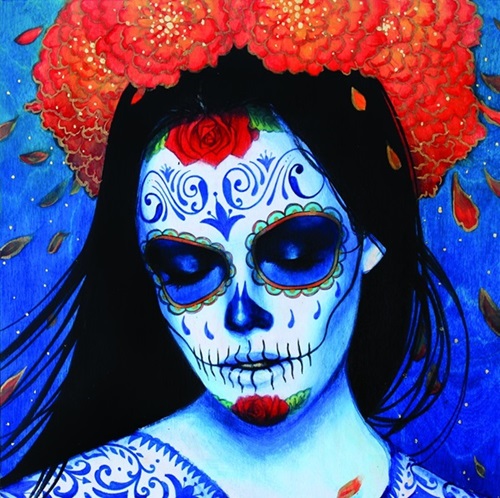The College of Bones
Bard's are most often found in The Freeholds and in Estoya, but a Bardic College was created in The Provinces of Mhirriah, a unique bardic college that operates within the everyday life of the people.
This would further place them in a role that is more official and governed by the Church of Mhirriah. Digging into the cultural heritage of the people in the provinces is a task that is forbidden by anyone who is not of sufficient rank in the church's hierarchy, and as such Bards are not allowed to collect and protect it. The College of Bones was established to collect the more current histories as well as to mark down the deeds and final wishes of those who died, handle legal documents, and act as morticians.
Those who trained at a The Bardic University, usually the Rouxsgate university as the provinces of Mhirriah lack a university of their own. They would travel back to seek patronage at the college of bones where they learn many skills to ply their trade. Those who operate within the college act as personal biographers for those who hire them, as well as notaries for official documents that pass hands between one party and another within their presence.
This would further place them in a role that is more official and governed by the Church of Mhirriah. Digging into the cultural heritage of the people in the provinces is a task that is forbidden by anyone who is not of sufficient rank in the church's hierarchy, and as such Bards are not allowed to collect and protect it. The College of Bones was established to collect the more current histories as well as to mark down the deeds and final wishes of those who died, handle legal documents, and act as morticians.
Those who trained at a The Bardic University, usually the Rouxsgate university as the provinces of Mhirriah lack a university of their own. They would travel back to seek patronage at the college of bones where they learn many skills to ply their trade. Those who operate within the college act as personal biographers for those who hire them, as well as notaries for official documents that pass hands between one party and another within their presence.
The House of Bones
The House of Bones lies in the middle of a graveyard in an underground crypt. This graveyard is considered holy ground as one of the many Ozolithian Markers that Mhirriah, The Warrior Empress created lies at its center. To be buried here is to receive a high honor and the only ones who fill the graves are those who prove themselves most worthy in battle and in the eyes of the church.
Within The House of Bones you will find rows and rows of shelving upon which blank parchment, chisels, spare quills, and wells of ink are neatly organized. Getting closer to the center where the vault lies, one will see more shelving. Skulls line these shelves in abundance. Thousands of skulls with the engravings of last wishes and great deeds etched upon them. It is common for each of them to be painted.
Common practice dictates that the skull should be painted in the favorite color of the person whose skull it belonged to. Intricate patterns are laced throughout and the writing filled in with a matching, but contrasting color to ensure it can be ready easily.
Within The House of Bones you will find rows and rows of shelving upon which blank parchment, chisels, spare quills, and wells of ink are neatly organized. Getting closer to the center where the vault lies, one will see more shelving. Skulls line these shelves in abundance. Thousands of skulls with the engravings of last wishes and great deeds etched upon them. It is common for each of them to be painted.
Common practice dictates that the skull should be painted in the favorite color of the person whose skull it belonged to. Intricate patterns are laced throughout and the writing filled in with a matching, but contrasting color to ensure it can be ready easily.
The Vault of Bones
The Vault of the college lies at the lowest level of the crypt. It is protected by many enchantments and strange conjured golems, fashioned from the leftover bones of the deceased who reside within the crypt. The golems are formless and use the bones to completely change and shift their form and size to match a threat that may wish to enter the vault without proper authorization. They can even break down, forming many skeletal formations that can all act independently of each other.
Within the Vault one will find ancient funerary rites as well as documents deemed valuable to the church. Unlike other bardic colleges, the bards in the College of bones are not allowed to enter the vault for any reason. The only ones allowed in are members of the church, to possess a series of fail-safes that can bypass the various forms of protection the vault has.
There is a secondary vault bards use for themselves containing various weapons and texts that each focus on a respect for death. Bards of the College of Bones see death as a form of evolution or change and value any great works that share in this view.
Within the Vault one will find ancient funerary rites as well as documents deemed valuable to the church. Unlike other bardic colleges, the bards in the College of bones are not allowed to enter the vault for any reason. The only ones allowed in are members of the church, to possess a series of fail-safes that can bypass the various forms of protection the vault has.
There is a secondary vault bards use for themselves containing various weapons and texts that each focus on a respect for death. Bards of the College of Bones see death as a form of evolution or change and value any great works that share in this view.
Coroners
Those who operate within the College of bones are well acquainted with many examples of anatomy. They are capable of performing autopsies and determining causes of death. They are capable of performing most funerary rites held in each province, as well.
They prepare the bodies of the dead and engrave what effectively stands as a last will and testament of the deceased onto the subject's skull. The Seal of Bones is then placed on the forehead of each skull, as the engraving is considered an official document enforced by the church.
This is to establish that the last wishes the deceased were properly carried out and the engraving and stamp on the skull is to demonstrate a sense of finality to the process ensuring that the dead can rest easy.
They prepare the bodies of the dead and engrave what effectively stands as a last will and testament of the deceased onto the subject's skull. The Seal of Bones is then placed on the forehead of each skull, as the engraving is considered an official document enforced by the church.
This is to establish that the last wishes the deceased were properly carried out and the engraving and stamp on the skull is to demonstrate a sense of finality to the process ensuring that the dead can rest easy.
The Seal of Bones
Each bard of the college possesses a stamp that depicts the Seal of the college. Stamping the seal on a document makes that document official in the eyes of all who dwell in the provinces by authority of the Mhirrian church. The stamp depicts a spider made of bones, the abdomen of the spider being a skull.
The spider sits on a white spearhead on a black field. The stamp uses ink with traces of the bard own blood as well as drops of blood from all parties involved when used. If used for a funeral, a small bone from the deceased is ground into dust and used in the ink instead.
This is to ensure documents cannot be forged as matriarchs of the church can test the ink and also determine whether or not blood was willingly given.
The spider sits on a white spearhead on a black field. The stamp uses ink with traces of the bard own blood as well as drops of blood from all parties involved when used. If used for a funeral, a small bone from the deceased is ground into dust and used in the ink instead.
This is to ensure documents cannot be forged as matriarchs of the church can test the ink and also determine whether or not blood was willingly given.



I kinda feel like these abilities could be a bit too restrictive on roleplay. That aside, how about a grumpy old bone bard who just can't wait to die?
Oh pray tell! I havnt tested them yet. Tell me more. One can be a part of any number of colleges, so I wasn't toooo focused on it. I definitely want to fix it if its a potential issue. That actually sounds fantastic. To use a dnd analogy, it sounds like playing a bard that hates his high charisma score and just wants to rest and I love it.
Lemme just jot down my thoughts on Routine: Passing. Not every bard would take the time to comfort every enemy they encountered while they were sitting there helpless for a second. in fact, many would use the opportunity to stab them and end the fight without additional unnecessary bloodshed. That said, not all enemies would be susceptible to such jarring questions, such as a cultist who's already accepted the fate of the universe as pointless and is just throwing themselves at the PCs to slow them down while the ritual of doom finishes. If the source of the ability is more magical than mundane, however, that could fix itself. You might fix it by making the bard use an action or bonus action (to make a parallel to DnD 5e) to use the ability each turn instead of forcing them to forfeit their next turn whenever the bad guy fails a save. Routine: ending has great roleplay potential, like with a bard who's failed to put so many souls to rest he's constantly haunted by one or another. because of that, though, you actually might want to take away the short-term benefits associated with it and put those on a similar ability just so you're not shackled with a long side quest just because you need a few hit points right now, you're shackled with it because that's what you and/or your character wants to do. All that said, I haven't tried it either and I'm no expert, those are just my thoughts.
hmmm. very valid points. ill try to go through and rework the abilities, maybe making "passing" a passive ability.it is magical in nature, but some wouldnt be effected as you say. hmm, lemme see. as far as ending goes, i agree. ill have to rework it to make the role play less of a chore for a player. Food for thought. to be sure.